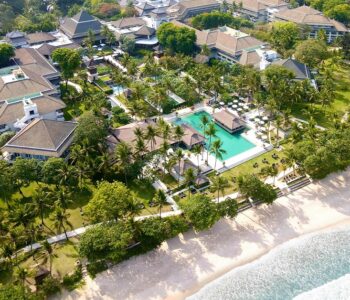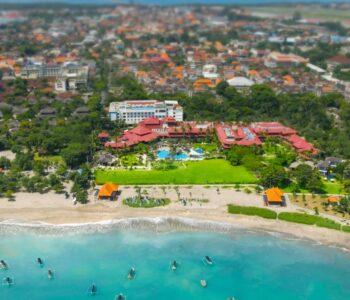Historian and art critic Jean Couteau brings us stories depicting the life on Bali, sometimes real, sometimes myth, always meaningful.
Once upon a time, there lived a man by the name of Kama Jaya in the village of Kelam, by the beach of Bali Dwipa, now better known as the Island of the Gods. Nature endowed him generously with wide, well-built shoulders and a good, strong chest. He sported a luxurious moustache and his seemingly fierce eyes reflected a brave and courageous soul. This man was to go down in history as the first fisherman of Bali.

One day, Kama Jaya received an invitation from the god called Sang Hyang Siwa who wished to bestow blessings on his life. A similar invitation was also addressed to all other creatures living on the surface of the Middle World.
Kama Jaya felt anxious. “When I meet with Siwa in his heavenly chambers, what gift can I bring that shall be good enough to serve as a token of thanks for the blessings I am going to get in return?”
Finally, after hesitating for a long time, he decided on making a present of fish. So he went out to sea. But so good was his catch that he stayed at sea a long time. He then had to hurry to keep his appointment with Siwa, his catch of fish trailing along behind him. Alas, he couldn’t arrive on time and Siwa was very displeased.” Kama Jaya, why are you late in coming,” reprimanded the god,” all your fellow creatures have come here and they are already gone.”
“Oh, most Gracious One, please forgive your humble servant. I went fishing so as to be able to bring a worthy gift for your Gracious One.”
Siwa had no love for half-hearted believers. He smiled at Kama Jaya’s explanation, but he was nonetheless stern in the decision he took.” Well, Kama Jaya,” he said, “because you are so late, your blessings will be short and last just one day.” Kama Jaya did not reply. He got up, bowed, and with Siwa’s words ringing in his ears, he departed a forlorn man.
The following day, Kama Jaya returned to sea as a fisherman. Wondering what his blessing would be, he rowed his boat far out to sea.

Suddenly, what did he see? A hill seemed to rise out from nowhere in the middle of the sea. It was a wonderful sight indeed to behold from a distance. Unbeknownst to him, there was a priest, Begawan Bregu, famous since Bali Dwipa’s first days, who had made his home at the peak of this hill, today known as Bedeeng. He made his days busy with the task of stone carving. The finished pieces of carved stones were then arranged into a temple, which was to stand at the top of the hill.
As Kama Jaya’s gaze wandered toward the top of the hill, he was astonished at the spectacle of this very old priest so focused on his work, and seemingly impervious to what happened around him. Bringing his boat to shore, he could not help but marvel at the temple taking shape under the hands of the priest.
Yet, it was not long before Bregu became aware of being watched by Kama Jaya. He was upset at this discovery, because he wanted his temple to be a surprise to the world. So he decided to destroy what he had built so far, and to start anew somewhere else. So down went the intricately arranged piles of stones, sent tumbling into the sea below by the angry old man. As they hit the water up jumped hundreds of fish into the boat of Kama Jaya, who was indeed overjoyed at such a catch.

Meanwhile, Bregu left Bedeeng hill and headed Southward. He arrived at the tallest hill that rose from the sea, from which he had a stunning view over the huge sea breakers below. It would be the right place to build a temple facing the sea, he thought. So he started to work, arranging carved stone upon carved stone, until it made up a beautiful temple, up there, on the tip of the cliff. When viewed from the middle of the sea, the hill had the shape of a human head, hence its name of Ulu Watu, the head of stone.
Kama Jaya, meanwhile, had set off for home with his boat-load of fish, reveling in his good fortune. He did not feel the scorching sun on his back or the sweat that was soaking his whole body.
As he pulled up his boat onto the shore, he congratulated himself once again: his wife would be happy; fish meant food and money. Alas, when the moment came for unloading, Kama Jaya froze in incredulous dismay. He felt all his strength draining away; perspiration bathed his body. There were no fish at all. All the fish had transformed into stones.
As the poor fisherman stood there in awe, a loud voice roared above the sea: “Oh you, Kama Jaya, you are a fisherman, but you are not working hard enough at your work, you prefer spying the works of a holy old man. Know that you and all your generations henceforth are cursed and will never become rich from fishing”.

Hearing this curse, the poor man slumped down heavily on the sandy beach, gazing out into the sea, with blank, empty eyes.
From that day onward, Kama Jaya began a daily struggle to make ends meet on his meager earnings as a fisherman. When at sea, he would sometimes look southward in the distance, to the Uluwatu “head of stone” where now stood one of Bali’s most beautiful temples: Pura Uluwatu. He thought he heard the old priest laugh in the distance. It was the laugh of his karma.






